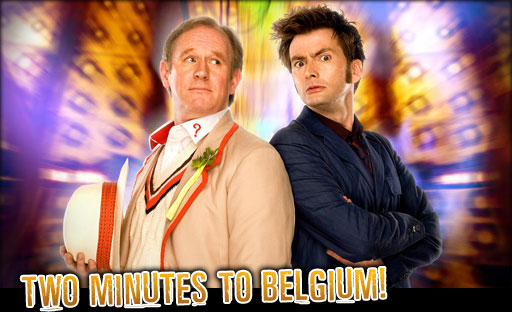
Aired 16 November 2007
It’s odd, but since the modern relaunch of Doctor Who there has remained a vocal minority supporting the claim that the programme is now Doctor Who in name only, ignoring what came before it and being so different that it can’t possibly be the same. This despite the many very overt attempts the production team has made at linking the two eras while presenting something accessible to modern audiences. And so, for those who are unsatisfied with not seeing McGann’s regeneration and can’t get past the destruction of Gallifrey in the off-screen Time War, ‘Time Crash’ arrives as a short love letter to the past, brazenly bringing together the two eras and their differences as the Fifth Doctor meets the Tenth.
While it makes perfect business sense to include the likes of the Master, the Daleks, and the Cybermen as foes, the show wisely took its time in actually saying the name Gallifrey and even in showing the eight previous incarnations of the Doctor. Now that Doctor Who is an unabashed success, it makes sense that the links to the past are becoming more overt as well; David Tennant, an avid fan of the classic series, and Peter Davison, the incarnation of the Doctor that Tennant considers arguably his most definitive, are the perfect pair to put in the first multi-Doctor tale of the modern series.
Peter Davison may always live in the shadow of his predecessor, but a good deal of ‘Time Crash’ is spent explaining how much of Tennant’s outfit and characterization is drawn from Davison’s version. Writer Steven Moffat has gone on record as well, explaining in detail how much he loves Davison’s performance even if the scripts aren’t necessarily the strongest. While all of the actors who have portrayed the Doctor have brought their own unique flare and been larger than life as required, Davison always managed to showcase himself as a true actor while others would sometimes rely on being a performer more.
Just as the format and the pacing of the programme has changed with time, so, too, has the dialogue. Davison proves adept at keeping up with the more modern and casual slant on words and delivery while staying true to his Doctor. So without relying on the excessive technobabble so prevalent in the ’80s, Davison is able to explain the situation with lines that would easily fit into a typical Tennant script while still sounding like the Fifth Doctor. In a sense, the Fifth Doctor and Davison provide the perfect bridge between the two eras, showing that the pacing and dialogue of the modern series meshes perfectly with those of the classic. More than that, though, it offers Davison a chance to remind audiences of just how strong he is as the Doctor and how overlooked his era often is.
So while the fourth wall comes perilously close to breaking as the Tenth Doctor proclaims his love of being the Fifth, ‘Time Crash’ ends up being a perfect nod to the past, showing just how deeply the classic series is appreciated by the entire current production team. It’s not a hard-hitting episode that will change the mythology of the show, but seeing the more manic and easily-excited Tenth Doctor interact with the more subdued and stern Fifth Doctor as they try to separate their TARDISes to prevent the creation of a Belgium-sized hole in the universe through some clever use of time and memories is a definite treat for fans old and new. Past viewpoints looking to the future and current viewpoints looking to the past are meshed superbly, even if the Tenth Doctor’s memory of the solution does raise questions of why he can’t remember other aspects like his discussion about the Master being back.


Leave a Reply